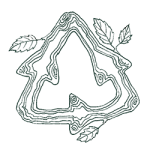Teachings of the Trolls
Save Seeds & Plant More Trees
![]()
Saving seeds and planting more trees are important steps to preserving diversity among wild plants and food crops. This variety of life, or biodiversity, builds the earth’s resilience to challenges and change. When an ecosystem loses complexity and variety, it also loses balance and stability. By saving seeds, we can protect the genetic diversity of plants, and by planting them, we can ensure the next generation of plants we grow will be as resilient as possible.
It is estimated that there are 3 trillion trees in the world, and while that may seem like plenty, it is less than half the number of trees that were on the planet 10,000 years ago. Every year, 15 billion more trees are cut down. Trees are one of the most important organisms on Earth: they store carbon from the atmosphere in their bodies, prevent soil erosion, filter the air and water, and provide homes for about 50% of the planet’s land-dwelling animals. Planting trees is also one of the most important solutions to cheaply and effectively removing the carbon humans have added to the atmosphere. Forests keep us alive, and by remembering to save seeds and plant more trees, we can help keep them alive, too.
How to help:
- Plant trees in your own yard or community and remember to practice “right tree, right place” when selecting and siting the tree. Read more about “right tree, right place” from the Arbor Day Foundation.
- Get help selecting the right tree using the Arbor Day Foundation’s Best Tree Finder or the Urban Forest Ecosystem Institute’s SelecTree tool.
- Learn how to grow natives from seed with Wild Seed Project and take the pledge to rewild your home and community.
- Postpone your deadheading and let your spent flowers go to seed! Use this template to make your own envelopes for storage, and get ideas for which seeds to save from Fedco Seeds.
- Support forest restoration on a larger scale by donating to groups like American Forests and the 1 Trillion Tree Movement that focus on biodiverse restoration efforts.
- See how the most forest-influential companies rank in their commitment to sustainability, and avoid supporting irresponsible companies by using Global Canopy’s Forest 500 index.
- Get inspired to save your own seeds by Will Bonsall, a Maine farmer on a mission to save rare heirloom seeds through the Scatterseed Project.
- Save your seeds and participate in seed-saving exchanges like Seed Savers Exchange.
Reduce & Reuse

This familiar phrase is more important than ever. We are in the midst of the sixth mass extinction on Earth, with reports showing that we have lost 60% of global biodiversity in the last 40 years. The root causes of biodiversity loss are population growth and overconsumption. Recycling is important, but minimizing the amount we consume can have an even bigger impact.
In Maine, every person creates about 3.4 pounds of trash every day. Although Maine set a goal to reduce per capita waste disposal by 5% every five years, Mainers actually increased their yearly amount of waste by over 10% between 2014 and 2019. The amount of trash we produce doesn’t just come from how much we consume. Much of this garbage is also created through poor design— wasteful production processes, unnecessary packaging, and products intentionally made for limited use. We can reduce our waste by consuming less, choosing products made more thoughtfully, and giving new life to what is left behind instead of disposing of it. When we re-think the way we produce and consume, we do something more powerful than just eliminating our waste—we also eliminate the idea of waste.
How to help:
- Cut plastic and single-use items out of your daily routine.
- Buy used items from second-hand stores like your local ReStores, and borrow, rent, or share things you don’t use often.
- Stop catalogs and junk mail from getting sent to you with CatalogChoice.org and OptOutPrescreen.com.
- Get inspired at Earth 911, a website with information about how to reuse and recycle almost anything, anywhere.
- Check out the State of Maine’s Department of Environmental Protection for the state’s goals and advice on recycling.
- Stay informed about waste management through the Natural Resources Council of Maine and help them support legislation like recycling reform in Maine.
Discover & Share Stories of the Woods

Both people and the environment benefit when we spend time in nature. Rachel Carson once said, “The more clearly we can focus our attention on the wonders and realities of the universe about us, the less taste we shall have for its destruction.”
We become better stewards of the environment when we get to know the nature in our communities. In fact, the two biggest factors that contribute to environmental stewardship in adulthood are time spent in nature during childhood and having role models who care for nature. In turn, research shows that when children spend time outdoors, they benefit from better social skills, increased self-esteem, greater enthusiasm for learning, and reduced stress and anger.
So, get to know the names of the trees and wildflowers where you live. Look for their presence or absence from place to place and from year to year. Learn animal tracks or bird calls to better understand the seldom-seen wildlife that fills a healthy forest. Take notice of patterns in the woods like which side of tree trunks mosses tend to grow on. Then when you find something you love about life in the forest, become a role model and help others expand their sense of wonder.
How to help:
- Pick up a field guide from Gardenshop to help you identify the wildlife in the woods.
- Download identification apps like Leps for butterflies and moths, PlantSnap or Pl@ntNet for plants, and Seek or FieldGuide for all wildlife.
- Discover new trails and make new connections to the outdoors using Maine Trail Finder .
- Download activities to help your children and family get closer to nature, deep in the woods or in your own backyard, thanks to Project Learning Tree, sponsored by Forests for Maine’s Future.
- Unearth new stories by contributing to community science projects like the Forest Ecology Research Network, Signs of the Seasons phenology monitoring, eBird, Great Backyard Bird Count, Project Feeder Watch, Maine “Big Night” amphibian monitoring, iNaturalist, or search for more in your areas of interest at SciStarter.com!
- Learn about all the benefits children can gain from spending time in nature through the Children and Nature Network.
- Amplify your voice and create systemic change by advocating for policy locally, regionally, nationally, and globally.
- Encourage and support local initiatives to protect habitat and decrease threats to biodiversity such as deforestation, invasive pests and diseases, and our rapidly changing climate.
